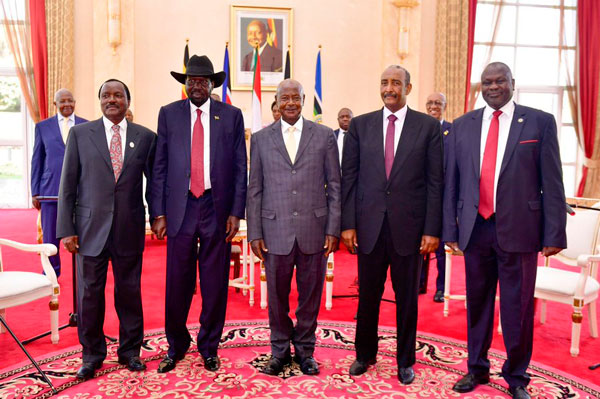
Nairobi, Kenya | AFP | Ahead of a key IGAD Assembly of Heads of State and Government meeting due Friday in Addis Ababa, United Nations (UN) monitors have warned of the failure of Kenya and Uganda to enforce sanctions on war-stricken South Sudan
The Intergovernmental Authority on Development (IGAD) is today holding it 47th Ordinary Session of IGAD Council of Ministers, to be followed by the 13th IGAD Assembly of Heads of State and Government tomorrow.
The issue of South Sudan will be prominent in the official meetings and outside it, where several talks will be held with exiled South Sudan leader Riek Machar.
Machar, leader of the opposition group Sudan People’s Liberation Movement-In-Opposition (SPLM-IO), resides in Khartoum but cannot travel to the other IGAD countries without permission.
Peter Manawa Gatkuoth, deputy spokesman of the SPLM-IO, told Radio Tamazuj that Machar will meet a number of regional leaders at the sidelines of the ongoing IGAD meetings in Addis Ababa.
“We are not part of the ongoing IGAD meetings in Addis Ababa, but we will hold sideline meetings with IGAD leaders there,” he told Radio Tamazuj .
In a meeting in Uganda on November 7, Kiir and Machar agreed to give themselves another 100 days beyond the November 12 deadline to form a unity government.
UN sanctions
On Tuesday, a published UN special investigators report stated that Kenya and Uganda failed to enforce sanctions on their war-stricken neighbour South Sudan, including an arms embargo and travel bans,
Providing an update to the Security Council, UN monitors said they had identified bank accounts in Kenya linked to rebel leaders and evidence of Ugandan military forces inside South Sudan, among other infringements by East African nations.
“The region has not consistently enforced the arms embargo or the asset freeze and travel ban on sanctioned individuals,” said the Security Council-mandated team of expert investigators.
The panel said inconsistent international support for a South Sudan peace deal had contributed to a “dangerous stalemate” in a country where some 400,000 have died in fighting since 2013.
It singled out Kenya, Uganda, Ethiopia and Sudan as having “not demonstrated full and consistent engagement in the peace process” and breaching terms of UN sanctions designed to prevent further conflict.
According to the report, Paul Malong, a former army chief turned rebel leader, travelled from Nairobi to Johannesburg in July on a Kenya Airways flight using a Ugandan passport.
Malong was slapped with a travel ban by the UN for obstructing peace, contributing to war and ordering atrocities against civilians.
Investigators also found bank accounts in Kenya linked to Malong and Malak Reuben Riak Rengu, another former security official sanctioned for serious crimes.
The panel also received “multiple credible accounts” that Uganda stationed troops in Yei River State in October, violating an international arms embargo on South Sudan and complicating peace efforts.
Uganda’s engagement in South Sudan mediations “has emboldened the hard-line positions of the incumbent government”, investigators said.
South Sudan President Salva Kiir and his main rival, Riek Machar, missed another deadline this month to join forces in government, further undermining a fragile truce that has held largely since September 2018.
In last-minute talks hosted by regional leaders in Uganda, a 100-day extension was granted for Kiir and Machar to resolve differences over the terms of peace and power sharing in Juba.
“Ethiopia, the current chair of (regional bloc) IGAD, and Kenya, the top candidate to succeed it, have not demonstrated sufficient political and diplomatic will to consistently support the peace process,” the report said.
The United States, angered at another delay in the peace process, recalled its ambassador this week, after Secretary of State Mike Pompeo publicly questioned the suitability of Kiir and Machar to lead South Sudan.
Juba expressed its regret Tuesday at Ambassador Thomas Hushek being recalled and accused Pompeo of “total disregard of the norms” of diplomacy by calling into doubt Kiir’s leadership capabilities.
 The Independent Uganda: You get the Truth we Pay the Price
The Independent Uganda: You get the Truth we Pay the Price





